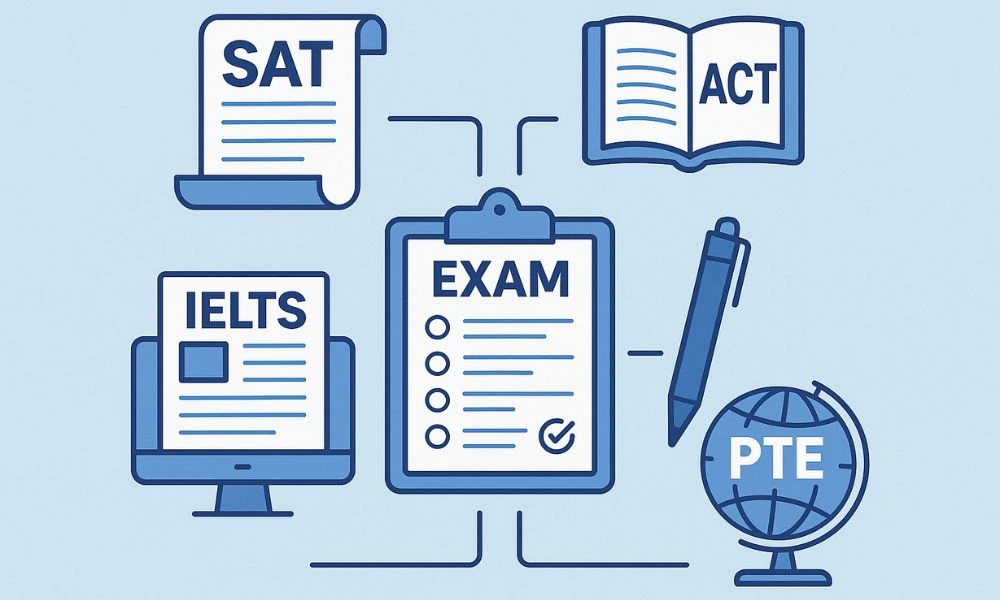Table of Contents
If you are going to Singapore in 2025, then you’ll need more than just high marks on your school report card. Most top universities in Singapore, now require international students to submit standardized test scores. They are to prove both English proficiency and academic aptitude. Whether you are applying for a Bachelor’s or a Master’s, Singaporean institutions want to make sure you’re truly ready to learn in English-speaking classroom. But here’s the catch. The exams you need depend entirely on:
- What course you’re applying for (Undergraduate or Postgraduate)
- Which university you’re targeting (each has its own entry requirements)
From English tests like IELTS and TOEFL, to aptitude exams like SAT, ACT, GMAT, and GRE, this guide breaks down everything you need to know, with score ranges, university-specific benchmarks, and tips that’ll help you apply with confidence.
What Exams Are Needed to Study in Singapore for International Students?
If you are planning to study in Singapore, then get ready. It’s not just about grades, but also about the right exams. Most universities in Singapore don’t just look at your school marks anymore. They want to see proof that you can handle university-level English and that you’re academically prepared for your chosen course.
According to the 2024 Study Abroad Trends Report, over 72% of Indian students who applied to Singapore took at least one standardized test like SAT, GRE or GMAT. And nearly 90% had to submit English test scores such as IELTS or TOEFL. Why? Because Singaporean universities, like NUS, NTU, and SMU, want to make sure you’re ready for an English-speaking classroom. So, what tests should you be preparing for? It depends on two things:
- The course you’re applying for (Bachelor’s or Master’s)
- The university (each one sets its own rules)
Below is an overview of exams that you might require if you want to study in Singapore:
| Category | Exam Name | Score to Aim For |
| English Proficiency | IELTS | 6.0+ (UG), 6.5+ (PG) |
| TOEFL iBT | 80+ (UG), 90–100+ (PG/MBA) | |
| PTE Academic | 55+ (UG), 58–65+ (PG) | |
| Duolingo English Test | 105–120+ | |
| For Bachelor’s (UG) | SAT | 1250+ |
| ACT | 27+ | |
| For Master’s (PG) | GRE | 320+ overall, 160+ in Quant |
| GMAT | 600–750 | |
| Creative Courses | Portfolio + Interview | NA |
| Other | University Interview / Test | Varies |
Which English Proficiency Tests Are Accepted in Singapore?
Before going to Singapore, one needs to prove your English skills. especially if you’re from a non-native English-speaking country like India. Since English is the official language of instruction in almost all Singaporean universities, submitting a valid language proficiency test score is part of the application process for most international students. Even if your previous education was in English, universities might still ask for a score to meet academic or visa requirements.
In fact, Singapore’s Student Pass (visa) often requires formal proof of English ability. So having a recognized test score like IELTS or TOEFL is usually non-negotiable. Now, while IELTS and TOEFL are the most widely accepted, newer tests like Duolingo and PTE Academic are also gaining ground. Here’s a quick one-glance table to help you understand what scores you’ll need for top universities:
| University | IELTS (Min. Score) | TOEFL iBT | PTE Academic | Duolingo English Test |
| National University of Singapore (NUS) | 6.5+ | 85+ | 62+ | Not Accepted |
| Nanyang Technological University (NTU) | 6.5+ | 90+ | 55+ | Not Accepted |
| Singapore Management University (SMU) | 6.5+ | 90+ | 66+ | Limited Use |
| Singapore University of Technology & Design (SUTD) | 6.5+ | 85+ | 61+ | Not Accepted |
| INSEAD (Singapore Campus) | 7.0+ | 103+ | 70+ | Not Accepted |
| James Cook University Singapore | 6.5+ | 80+ | 65+ | 105–115+ |
| Amity Global Institute / LSBF | 6.0+ | 78+ | 50+ | 105–120+ |
Is the SAT or ACT Required for Undergraduate Courses in Singapore?
Wondering if you really need to take the SAT or ACT to study in Singapore? You’re not alone. With so many different boards, universities, and entry routes, it can get confusing fast. Here’s the real deal. Singaporean universities don’t always make these exams compulsory, but they can definitely boost your application. Especially if you’re from a state board or applying to a competitive course.
In fact, based on 2024 application data, around 30–40% of Indian students applying to NUS and NTU submitted SAT scores, and most came from non-CBSE backgrounds. These exams serve as an extra way to prove your academic ability when your board marks alone might not tell the full story. Following is the SAT/ACT Requirements at top Singapore universities (2025)
| University | When It’s Needed | Recommended Score |
| NUS (National University of Singapore) | Required for state boards, international curricula, or average scores | SAT: 1250+ ACT: 27+ |
| NTU (Nanyang Technological University) | Strongly suggested for non-CBSE/IB/A-Level students | SAT: 1250–1350 ACT: 27–30 |
| SMU (Singapore Management University) | Boosts profile for business/finance programs | SAT: 1300+ ACT: 28+ |
| SUTD (Singapore Univ. of Tech & Design) | If applying via local diplomas or international boards | SAT: 1250+ |
| INSEAD (UG-level partner programs) | Not applicable (focuses on postgrad) | NA |
Do I Need GMAT or GRE for Postgraduate Studies in Singapore?
So, you’re planning to pursue a Master’s or MBA in Singapore? Smart choice. This vibrant city-state has become one of Asia’s top study destinations. It is especially true for international students aiming for globally recognized degrees in tech, business, or policy. But before you start dreaming of life on campus, there’s something important to tackle entrance exams.
According to the 2024 QS Asia Admissions Report, nearly 78% of international students applying for postgraduate programs in Singapore submitted a GRE or GMAT score. And for MBA applicants, the number jumps to 92%. Here’s how it usually works:
- GRE is your go-to for STEM fields like Engineering, Computer Science, Psychology, and even some Social Sciences.
- GMAT is the preferred choice for MBAs and Business Analytics programs. But increasingly, many B-schools in Singapore now accept GRE as an alternative.
Some programs waive these tests if your GPA is high or if you bring strong work experience to the table. Below are the GMAT vs GRE requirements for postgraduate admission in Singapore (2025):
| University / Factor | GMAT Requirement (MBA / Business) | GRE Requirement (MS / Non-MBA) |
| NUS (National University of Singapore) | 600+ (MBA); higher for scholarships | 320+ (Engineering, Public Health, Sciences) |
| NTU (Nanyang Technological University) | 600+ (Nanyang MBA) | 319+ for Tech / Science programs |
| SMU (Singapore Management University) | 600+ preferred; GRE accepted | GRE accepted (Business Analytics, Econ) |
| INSEAD Singapore | 700–750 expected (MBA) | GRE 330–340 accepted in place of GMAT |
| James Cook University Singapore | GMAT recommended, not mandatory | GRE optional for most courses |
| SUTD (Singapore Univ. of Technology & Design) | GMAT not required (no MBA program) | GRE mandatory for Tech Master’s |
| Test Cost (India 2025) | GMAT: ₹25,163 (center), ₹27,218 (online) | GRE: ₹22,550 (general), ₹14,500 (subject) |
What Documents Are Needed Alongside Test Scores To Study in Singapore?
Submitting your test scores is just the beginning of your application journey to Singaporean universities. Whether you’re applying for a Bachelor’s, Master’s, or even a PhD, you’ll need to pull together a full application package. And here’s the reality: top universities like NUS, NTU, and SMU don’t just assess scores. They look at your entire profile, including your grades, personal achievements, work experience, and even how you tell your story in your SOP.
Did you know? According to the 2024 Asia Student Mobility Report, 82% of international applicants to Singapore submitted at least five supporting documents beyond test scores. For postgraduate programs, that number rises to seven or more. Below are the important documents that are required to study in Singapore:
| Document | Undergraduate Applicants | Postgraduate Applicants |
| Academic Transcripts | 10th & 12th or A-Level/IB results | Bachelor’s degree transcripts with GPA/percentage |
| English Proficiency Test (IELTS/TOEFL/PTE) | Required unless exempted | Mandatory if previous education wasn’t in English |
| SAT/ACT Scores | Optional; recommended for state board students | Not required |
| GRE/GMAT Scores | Not required | GRE for MS; GMAT for MBA/business |
| Statement of Purpose (SOP) | 500–750 words, course-focused | Tailored, goal-driven and program-specific |
| Letters of Recommendation (LORs) | Usually 2 from teachers/counselors | 2–3 academic or professional references |
| Resume/CV | Optional but helpful | Mandatory, showcase experience & leadership |
| Passport Copy | Valid for at least 6–12 months | Required for admission & visa process |
| Proof of Funds | Minimum SGD 15,000–25,000 | Minimum SGD 20,000–30,000 |
| Work Experience Certificates | Not required | Required for MBA, MSBA, etc. |
| Application Fee Receipt | SGD 20–50 depending on university | Same as UG; keep a copy for records |
Conclusion
So, what’s the final verdict? If you’re an international student eyeing a spot in one of Singapore’s universities, clearing the right exams is a crucial step. Not just for admission, but also for your visa approval. But don’t stop at exams. Remember, Singaporean universities also look closely at your SOP, LORs, resume, and proof of funds. A strong application isn’t about one perfect score; it’s about presenting a complete, authentic profile.
Looking for a verified, affordable place to stay in Singapore while you study? Let University Living help you book fully furnished student housing near your campus, which is safe, easy, and specifically made for international students like you.
Frequently Asked Questions
What is the entrance exam for Singapore universities?
There’s no single entrance exam for all universities in Singapore. Admissions are based on your academic scores, English proficiency, and sometimes interviews or subject tests. For undergraduate programs, SAT/ACT may be optional. For master’s, GMAT/GRE is usually required.
Which exams are required to study in Singapore?
Below are the exams that are required to study in Singapore:
IELTS (min score: 6.0) or TOEFL iBT (min score: 80)
SAT is usually not required for most universities
Some programs may waive English tests if your medium of instruction was English.
How can Indian students apply after 12th?
For Indian students applying after 12th You’ll need:
Class 10 & 12 mark sheets
IELTS/TOEFL scores (if required)
Statement of Purpose (SOP)
Letters of Recommendation (LORs)
Passport-size photos
Certificates for extracurriculars (optional but helpful)
How much does it cost to study in Singapore for Indian students?
Tuition fees for a bachelor’s degree in Singapore can range from:
SGD 10,000 to SGD 20,000/year (₹6–12 lakhs)
Some top courses may cost up to SGD 50,000/year (₹30 lakhs).
Living expenses are additional.
Which are the best courses to study in Singapore?
Top courses to study in Singapore for international students include:
Business & Management
Computer Science & IT
Engineering
Healthcare & Life Sciences
Hospitality & Tourism
These fields align with Singapore’s growing industries and job market.













